‘I’ll Kill You!’ An oral history of the John Calipari-John Chaney feud, 25 years later
Revisit one of college basketball’s most infamous blowups
February 13, 2019
When John Calipari arrived in Amherst in 1988, UMass was the doormat of the Atlantic 10.
The Minutemen put together 10 consecutive losing seasons before Calipari arrived, taking beating after beating from every team in the conference, as the program cratered for years after Jack Leaman’s departure in 1979.
But then things started to change.
Calipari’s rise was meteoric, his teams were enthralling and the rivalries he cultivated were heated, particularly with John Chaney’s Temple teams of that era. With UMass — and Calipari — at the center of the college basketball universe, things were bound to kick off eventually. And on Feb. 13, 1994, 25 years ago today, they did.
But perhaps not quite the way you think.
This is the story of the most famous incident the Mullins Center and UMass basketball have ever seen, told by those who bore witness to John Chaney’s legendary press room tirade.
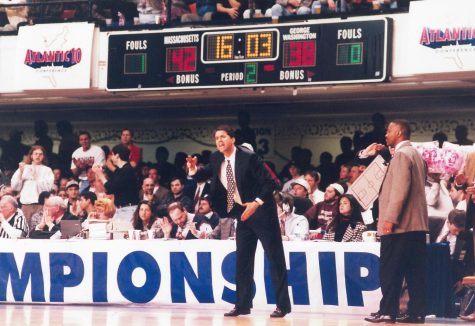
Calipari-Chaney, Round I
df
Jim Clark (Fitchburg Sentinel and Enterprise, now of the Boston Herald):
Well, I’ll actually take you back a little bit.
When I was still a student, my senior year I was actually working on the stat crew. So I was sitting at the scorer’s table at the old Curry Hicks [Cage], I don’t know if you’ve really researched the triple overtime game that happened that year, in 1990.
Joe Burris (Boston Globe, now retired): They’d got into each other’s faces back in 1990. Cal talked in his book about how UMass had been an easy win for Temple for so long, that Chaney wouldn’t uncross his legs whenever they played. So he said, at some point, I’m going to get those legs uncrossed.
Clark: So it was probably February, maybe right around this same time, maybe mid-February of 1990, there was a game at Curry Hicks, and it was actually on national TV back then. It was a Sunday afternoon and this probably was really only the second or third game right after things kind of took off over winter session while all the students were gone, and the team got popular and there were lines out the door to try to get into Curry Hicks, you know, one of those ‘don’t tell the fire marshal how many people are actually here’ things.
So the game winds up going to triple overtime, UMass loses by I think a point, like 83 to 82 or something. But there was an incident that happened during that game where there was an issue with the shot clock, and so Chaney came over and he was arguing with someone at the scorer’s table about the shot clock and we’re going to talk with our officials and all that.
Burris: It was hard to see where [Calipari] butted in, but he kind of listened in, and Chaney was like ‘don’t come in my huddle when I’m talking to the officials.’ And that incident is really where this all started.
“The second OT was marred by the second heated clock dispute of the game. The first came with 3:44 left in regulation, when Temple clearly didn’t get a shot off before the 45-second clock expired, but the officials didn’t hear the buzzer and gave Temple a field goal. After discussion and a brief shoving match between Chaney and Calipari, the shot was disallowed.”
–Jim Clark, Massachusetts Daily Collegian, Feb. 12, 1990
Clark: This is happening right in front of me because I’m sitting probably two or three seats from half court working on the stat crew and Chaney gets incredulous that Calipari came over to, you know, try to butt himself into the conversation, and next thing you know there’s a little bit of pushing and shoving and Chaney’s hand kind of rides up on Calipari’s throat a little bit and they got separated.
And nothing really became of it at that point. If you look back on it, it almost seems like Chaney kind of realized, you know this is going to start to become a problem for us. This team, they’re going to start to become a threat a little bit, and it wasn’t until a couple years later that UMass finally did beat them at the Cage.
Dan Wetzel (Daily Collegian, Patriot Ledger, now of Yahoo!): When I went to UMass, I’m sure I knew they had a basketball team, but it wasn’t on my radar at all. Like, every school has a basketball team, so I guess that was it, but I lived in Boston and I knew nothing about UMass basketball. They were never on TV, nothing, they had this little building, and nobody cared about it at all.
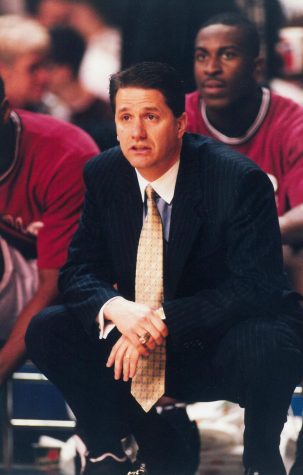
Clark: So basically, when Calipari arrived, UMass, had never beaten Temple, at all. It was like 0 and 20-something from the history of the series and for the most part wasn’t even close. Temple was the power with Chaney in the late 80s. Little bit of West Virginia, a little bit of Rhode Island, but Temple was really the team to beat in the A-10 back then. And so then Calipari arrives and it wasn’t until his second year, my senior year in 1990, that he really started to turn things around a little bit.
In Calipari’s first season in 1988-89, UMass finished 10-18 and went 5-13 in the A-10. In 1989-90, the Minutemen were 17-14 and 10-8 in the A-10 — the program’s first winning season in over a decade to go along with a trip to the NIT. 1990-91 saw an improvement to 20-13 and 10-8, a third-place finish in the conference, and all of a sudden the Minutemen were punching bags no more. And at the center of it all was Calipari, the brash new coach on the block.
Wetzel: Well, they got good. They made the NIT when I was a freshman, and I went to a game with some of my friends from my dorm, because the team’s winning and they were a fun team to watch, but it was just something to do. But the idea of UMass in the NCAA Tournament, there’s no way. And then you go watch them and you’re like, “I think these guys are pretty good.”
But at that time, they were in the Curry Hicks Cage, it was like 4,000 seats. It was like a high school gym, got a track running around it. You’d go to practice and there were phys. ed. classes and kids jogging. That’s not happening at Duke.
Burris: I always tell people, if you really want a lesson in mass psychology, just cover a college basketball coach at a major program. They’re just a piece of work. I don’t think [Calipari] ever got into anything close to an altercation with anybody else, but UMass had been a doormat for years, and he knew that he had a team that could beat a lot of people, and he knew that in order to kind of get to that level, he was going to have to call some attention to himself, and he was willing to do that.
He was not afraid to say, “these guys don’t want to play us. Any time, any team, any court.” He’d say it, someone would schedule them, and UMass would win. He just knew that in order to get through to that tight circle of these major coaches, you couldn’t be on the outside looking in, you had to call attention to yourself. He was a young guy, had a very young staff, players with a lot of bite and played like they had something to prove, and everything worked out like that.
Art Stapleton (Daily Collegian, now of The Record, NorthJersey.com): I mean Temple was the kingpin in the A-10. For however many years, it was Temple, and then it was everybody else. UMass didn’t just quietly slide in, UMass came in and Calipari puffed his chest out and walked around like a peacock, and they knew they were there, and I think he got under Chaney’s skin. And at that point, Chaney was like, I’m not having this. I’m not having this guy come into my league and thinking he’s going to act a fool and think he runs everything, that’s not happening.
Clark: They kind of went back and forth a little bit, I think Temple might’ve gotten them a few times on the road, then UMass wins their first A-10 tournament in ’92, they beat West Virginia in the final, then ’93 was the start of four straight years where UMass beat Temple in the A-10 title game — that one was at Mullins, Mullins had opened that year — it was pretty obvious at that point that the script had flipped, and UMass was the team in the A-10. You look back and you wonder, was Chaney not handling this very well? I don’t know, you can’t really get inside of his head.
Stapleton: There was this sense that it was still one-sided towards Temple. I remember my freshman year [1991-92], UMass didn’t beat Temp
le for the A-10 title, UMass beat West Virginia. So as much as the UMass-Temple games were there, the rivalry was one-sided toward Temple, at least for my perspective — and then it started turning. I don’t think UMass had the reputation, at least player-wise, until they beat Temple in that game, with the Calipari-Chaney stuff.
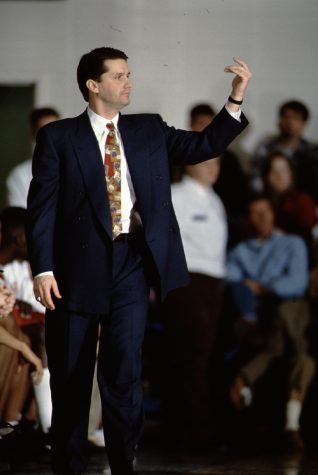
UMass’ string of dominance began in 1991-92, when Calipari’s Minutemen beat West Virginia in the A-10 title game at the Cage, before beginning a run of four consecutive A-10 championship game wins over Temple. That 1991-92 season also included the program’s first-ever win over Temple, after losing the first 21 meetings between the two teams.
Matt Komer (UMass team manager, 1992-96): It started before I got there. They had beat Temple I believe the year before I got there, the 1991-92 season, and that’s really when we had a chance at beating them. I’m a local kid so I was following it at that point, but we had not really quite established ourselves. And then we had a couple runs there where we were always playing Temple in the A-10 championship game. I don’t know how many years that was that we were doing that, but back then, in the Atlantic 10 tournament, the championship game was at the home court of the highest remaining seed.
You would go down to Philadelphia, play at the Palestra or the Philadelphia Civic Center, and whenever the championship game was, a day or two later, it was at the highest remaining seed. So we had a stretch in the 90s there where we played them three times a year. And at some point, we started beating them three times a year.
Stapleton: It’s almost like it swung to UMass, and now Temple was the program that was trying to catch up, and UMass had the guys. Calipari was like that gnat that came into the league, and was constantly going at John Chaney, going at [George Washington coach] Mike Jarvis, guys who were in the league for a long time and were established coaches. Calipari didn’t come in like I’m going to lay low, and I’m going to build my program — Calipari was a smack your face, I’m in, I’m here, and you guys are going to respect me. And I think it pushed Chaney over the edge, and that’s what we saw that Sunday in 1994.
Wetzel: The rivalry just sort of built up — were they going to beat Temple, could they beat Temple? Calipari had this basic concept that he held throughout his career: wherever you go, try and get into a rivalry with the biggest dog on the block. Whether that was Boston College in-state, or UConn in New England, or John Chaney in the A-10, and when he was at Memphis he’d try to scrap with Rick Pitino and Bob Huggins. When he was in the NBA he was trying to get something going with Phil Jackson — he didn’t mind that stuff. He liked it.
Burris: Chaney kind of had players that he wouldn’t allow to get emotional on the court, so they couldn’t really say much, he didn’t want that. UMass was different. They were kind of like that Al McGuire team at Marquette, they were colorful, they were fun to watch, they really got after it. They got in your face.
Edgar Padilla (UMass guard, 1993-97): Way before I got there, Temple was the team that dominated the Atlantic 10 for a long time, and Cal and his teams started to move up the ladder real quick, and they finally started beating Temple. When our class got to UMass — Tyrone Weeks, Carmelo Travieso, Marcus Camby and myself — that’s when we started beating them, and coach Chaney started losing control over dominating the conference. Things started escalating, game after game, against Temple, until that day.
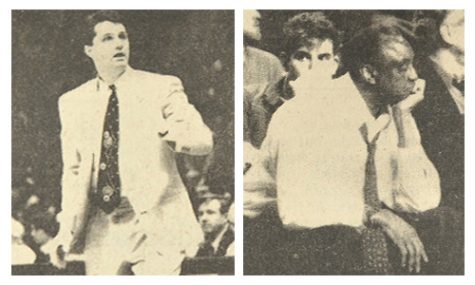
Feb. 13, 1994
“The showdown at the William D. Mullins Center on Sunday between the Minutemen and Temple will be a battle of the top two teams in the A-10. UMass, at 9-0, is in first place, while the Owls are No. 2 at 10-2. The game is being televised nationally by ABC.”
-Jeff Crofts, Massachusetts Daily Collegian, Feb. 11, 1994
Clark: Fast forward now to ’94, national TV game, I think [Dick] Vitale might’ve been doing the game, it was on ABC on Sunday afternoon. Great, great game, both teams were ranked, Temple was top 10, UMass was in the same area.
Stapleton: That was the Aaron McKie, Rick Brunson, and I think Eddie Jones, it was that [Temple] team. McKie and Jones were like the guys in the league at the time, and UMass was still kind of that upstart. They had [Derek] Kellogg, who wasn’t yet viewed as an elite A-10 player, Padilla was young, Carmelo Travieso I don’t believe even started playing a lot until the following year. Lou Roe obviously was a premier player, but he wasn’t at the level of McKie or an Eddie Jones.
Burris: Both teams were playing pretty well, and Chaney just got to where he just couldn’t beat [Calipari] anymore, he didn’t have anyone that could match up with [Marcus] Camby. I think he just got kind of frustrated; it went from always beating UMass to suddenly not being able to beat them anymore.
Jason Germain (UMass guard, 1993-95): It was good teams. It was like, okay, this is legit, Temple’s legit, UMass is legit, this is going to be a really good game. And the coaches, if it was just two Joe Shmoe coaches, it wouldn’t have been the same. The games would’ve been exciting, but having two coaches like that just added fuel to the fire.
Clark: It goes down to the buzzer, and Mike Williams, he was the money shot guy. He hit all the buzzer-beaters back then, for whatever reason.
Stapleton: I’m almost positive I remember Mike Williams hitting a runner in the lane, almost like a scoop-shot, one-handed runner to beat Temple on that day.
Clark: He takes this little floater from the right elbow, little 12, 15-foot shot, right at the buzzer, UMass wins by a point, and there was graciousness at the end of that game. Chaney came over and shook hands with Calipari, and everything seemed fine. And then the big debate becomes, what happened after that?
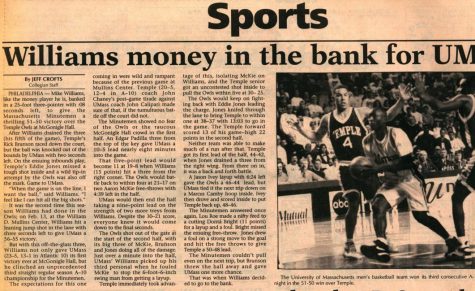
Komer: I think the chief complaint was that one of Chaney’s assistants mentioned to him that Cal had said something to the officials after the game, and Chaney didn’t take to that too kindly.
Burris: UMass won the game at Mullins, but supposedly Cal didn’t like a lot of the officiating. So supposedly he went up to one of the officials after the game and said something to him. Assistant coach from Temple either overheard it or heard about it, and he runs and tells Chaney that Cal said something to the officials after the win.
Wetzel: What I always remember, that nobody believes — Chaney did a press conference first. He was in the media room first, and he talked about how it was a great game, and the Atlantic 10 was really excited because it was on ABC on a Sunday afternoon, two top-10 teams or whatever they were ranked. It was a terrific game, and they were always trying to get more publicity than the Big East. He was just like “Mass,” — he always called them “Mass,” he never called them “UMass” — he was like “Mass has this great team, it’s a great game, great coach,” extremely positive and complimentary. And then he left.
“‘Great game, wasn’t it?’ Chaney said as he began his own press conference. ‘You’re as good as the company you keep, my mom said. We’re in good company here [at UMass].’”
-Mike Jensen, Philadelphia Inquirer, Feb. 14, 1994
Wetzel: People think he was angry at Calipari for this, that or the third, mad about the calls, about the game, but he wasn’t. He was good, at that point, Chaney usually was. He got outside, and he heard that Calipari, while he was waiting for Chaney’s press conference to be done, had gone after the officials or yelled at the officials or tried to have a meeting to explain some calls, and that’s why he came back in.
Everybody who covered the team at the time says the same thing – the common belief was that Calipari went after the refs in the Mullins hallway, and Chaney, in turn, went after Calipari. But according to the people who were there — Matt Komer, the student manager, and Larry Lembo, one of the referees that day — it didn’t quite happen that way.
Komer: It was standard protocol that I would follow Cal over to do the post-game radio interview and then follow him into the media room, and then we would do postgame interviews there.
Larry Lembo (referee for UMass-Temple, now retired): I’ll tell you right now, there’s not much to tell. Because that was probably the biggest anomaly in the history of basketball, in terms of how something like that developed, and there was really no basis for it.
Komer: It wasn’t much of a conversation. The referees were going off the court, and I think they might’ve actually been coming out of the dressing room by the time we got there, because we had to do the postgame on the radio. I don’t think there was any major, direct interaction, I don’t recall Cal having a real conversation with the officials.
Lembo: We worked the game, Temple-UMass is always a highly contested game. Great game, hard-fought. The game was over, and as we always do, the officials, we try not to pay attention to anybody unless there’s a beat reporter who comes in to ask questions, but nobody came in the locker room. Nothing was said. We went about our business, and left the building.
Komer: I don’t know if Chaney was confused, or — that was one of the questions that we had, because there was nothing like after the game that went on. So I don’t now if one of his assistants was talking about the end of the game, but I don’t recall that we stopped and had a conversation with the officials after the game in the hallway or anything.
Lembo: When I got home, my wife greets me at the door, and she says there’s like nine phone calls for me. AP, the Globe, every newspaper in the country was calling, and Mickey Crowley, who was the supervisor of the officials at the time, said “don’t speak to anyone until you speak to me.” And I was befuddled, like, what the hell’s going on? My wife told me what had happened, what they showed on TV, was that apparently Chaney went into Calipari’s press conference, and made some threatening remarks of some sort.
And I said, why? My wife didn’t know, so I called Mickey, and he gave me the background, and he said someone had said something to Chaney, that Calipari was outside in the hallway berating the officials.
And I said, that never happened!
The referees who were “berated” by Calipari were never spoken to, at least according to the referee in question. The flashpoint incident that set off one of college basketball’s most infamous blow-ups never happened. But somehow, some way, a Temple assistant informed Chaney that Calipari was after the officials, and down the Mullins hallway Chaney came.
Stapleton: I had a recorder, and I had it running the entire time. When Chaney came in, the initial instinct was that Chaney was going to congratulate Calipari on a hard fought game. And then, obviously, we realized it immediately.
Wetzel: I remember when he stepped back in I thought he was going to be like, “hey coach, good job today, we’ll see you in Philly” — he was so positive before. It was like a 180, and all of a sudden he just starts berating Calipari. And eventually, all hell broke loose.
From the tape:
Chaney: I just got my ass blasted down for giving them hell down in West Virginia, and here you get a hell of a job [by the referees] right here today, good job, three class guys, and you pick them out and single them out!
Burris: I think Chaney had just gotten reprimanded for something he did at West Virginia, the league had reprimanded him, so he got upset. Like I’m here getting reprimanded, this guy beats us and he’s still complaining.
Calipari: Coach! Coach! Let me tell you something coach, you weren’t there!
Chaney: Shut up, god damn it!
Wetzel: It just started escalating, and Calipari wasn’t going to back down. He started charging up there to get after Cal — and make no mistake, John Chaney was winning that fight — and the camera pans away, he got his hands like, Mike Williams and Derek Kellogg were in the way, and they had to try to restrain him, and he put his hands on Mike Williams to try and get at Calipari.
Chaney: I’ll kill you! You remember that, when I see you, I’m going to kick your ass! I’ll kick your ass!
Stapleton: I remember Mike Williams being in the middle of that, trying to pull the coaches away, and I was thinking, “this is just a disaster, what is happening here?”
Matt Vautour (Daily Collegian, now of MassLive): It always seemed funny looking back that the first guy ready to step in and block for Calipari was Mike Williams, who Calipari had a very complicated relationship with and ended up kicking Mike Williams off the team. But in that moment Mike Williams is the guy keeping Calipari from getting punched.
Clark: There’s a little bit of shoving or whatever, and the exchange continues, and you see the Temple coaches, and the shirtless players come running down the hall from the locker room once they catch wind of what’s going on, and so they come to drag Chaney out of there.
Burris: One of the administrators at UMass, his wife comes to the press conference, and she’s sitting right beside me before it starts. And she goes “this is my first press conference, I’ve always wanted to know what goes on in one of these things.” So she was absolutely floored, she thought this happened all the time.
Clark: We’re all just standing there like, “what was that? what just happened?”
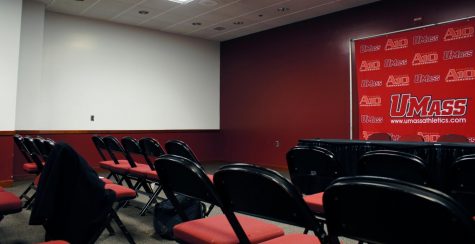
The Aftermath
“Some coaching rivals leave the battle on the court, but Temple Coach John Chaney decided to engage in a war of more than words with Massachusetts Coach John Calipari yesterday after Calipari’s Minutemen got a hard-fought 56-55 win over Chaney’s Owls in the William D. Mullins Center.”
-Arthur Stapleton Jr., Massachusetts Daily Collegian, Feb. 14, 1994
Germain: Well I was the walk-on so I obviously wasn’t in the media room, nobody was going to interview me about the one minute I got into the game, so we were sitting in the locker room. Obviously Coach Cal is very well dressed, to the T, to the nines, suit, shirt, everything looked good. And then he comes back in, and his shirt is all ruffled, his hair was a little messed up, you could tell something was wrong because he was always to the T. So he comes back into the locker room, and the guys who were in the media room come back and tell us what happened, and we’re like, “Wow, what?”
Komer: The conversation [in the locker room] from Mike Williams’ angle is like, you should’ve seen what happened, he’s telling everyone in the locker room that he jumped up and defended Cal, but after we saw the tape, Mike Williams basically just got pushed out of the way by John Chaney, which was the funny part at the time.
Germain: Cal didn’t say anything negative about John Chaney, he really didn’t. He just came in and said “hey, this is what happened, so if you hear anything or whatever, I have the utmost respect for him. I’m not sure what set him off, but we just got to move forward.” He was almost disappointed, because I think he looked up to Chaney and everything he’d done in the Atlantic 10.
Wetzel: I went into the Temple locker room to find out what the hell else [Chaney] had to say, and the Temple administration and everyone was like, “what did Chaney do?” And the players were asking like, “was there a fight?” No one knew what had happened, so there was a lot of confusion. Suddenly I’m telling them what happened, because none of them knew.
Stapleton: I had everything on a recorder, and we were huddled in the hallway, after the press conference, and back then, there was no social media. So it’s not like all of a sudden you can watch the video over again, or you can watch the video you shot on your phone. Really, all I had was the recording on my recorder — it had to be a tape recorder, it couldn’t have been a digital recorder back then — and I was playing it out in the hallway with Jeff Crofts, who was [Collegian] assistant sports editor at the time and covered the beat with me, and we were just kind of listening to it and couldn’t believe it. We were just sort of scrambling and transcribing.
Clark: People were tape recording it, and we all kind of went out and sat out on the floor, and we were telling the radio guys. Because they were still out doing the post-game show and everything, like “you’re not going to believe what just happened.” I remember we were all kind of gathered in little huddles because everyone was trying to transcribe the entire thing, because it was important to have the whole thing, expletives and all, verbatim. So we were all trying to get it, and we were playing it back and saying, “can you believe that just happened?”
Wetzel: Everybody’s just replaying the tape because it’s just so nuts. Like, did he threaten to kill him? Well did he mean he was going to kill him or he was just like “I’ll kill ya,” because with John Chaney you didn’t know, he’d say all sorts of crazy stuff. You don’t want to overplay it, right, but it was just very, very confusing. Honestly, it was absolutely awesome, it was the greatest thing I’ve ever seen — two coaches almost fought, I was pretty excited.
Stapleton: They were just tired of Calipari coming in and thinking he could do what he wants. I also do remember, Chaney and Calipari were similar in one sense — at that time, they were all over the referees. They were all over them, it was that kind of game. It was heated, Chaney was almost like, “I can get on the referees, but you can’t get on the referees. Who are you to come in and think that you can ride the referees, I’ve been here for x amount of years, who are you to come in and do this when I’m on the floor at the same time.” So for Chaney to start defending the referees was kind of funny, like the idea that Chaney wouldn’t be going to try and get an edge by talking to a referee during a game, they all did that.
Burris: There had been incidents leading up to that, Chaney had actually gotten into it with [Gerry] Gimelstob at George Washington, and Tom Davis at Iowa, so I always tell people, Chaney was kind of like that relative in the family that kids don’t talk back to. You might talk back to your mom or dad, but not that uncle, not that grandmother, because she might get right with you. He was like that, he was old-school, and he didn’t care. On the one hand, you know he was like, but it was almost like he just snapped.
Vautour: I was at the game, and then I went from the game to the Collegian, and [Stapleton and Crofts] come back to the Collegian, and they’re like, “you’re not going to believe this.” They played it on one of those old audio tapes, and we were just playing it back over and over again. The crazy thing too was like, nothing was instantaneous at that point. Not only was there no Twitter obviously, I didn’t have an email address. Everybody was just sitting and waiting for the six o’clock news to come on, and I think the only camera in the room was ABC 40, and almost every video you see, their little logo is in the corner.
Stapleton: It’s 1994, there’s no internet, no social media. I mean, if it happened now — it was a Sunday, where are students getting that information? They’re not going online; if it was something on the court, fans would see it, but it was in the back. At that time, it was like the George Michael Sports Machine, and UMass campus cable was horrible, we had like four stations. One was like the NBC affiliate in Springfield, and then we had a campus movie channel that played “Boyz n the Hood” five times a day, and that was all you got.
So I don’t know if it had the full impact until people started seeing it on the news, or read about it Monday morning in the Collegian. If you’re on campus, you weren’t getting it on TV, you weren’t on social media seeing all these things.
Vautour: Everybody talked about it. In classes, everybody. People were suddenly like “I’ll kill you!” out of nowhere, everybody suddenly had a John Chaney imitation, everybody could do his raspy voice and would yell that at each other.
Everybody kind of knew John Chaney was a little crazy, but that was beyond reason. Two other coaches at some point or another Chaney had attempted to strangle, but the highlights weren’t readily available at that point so they were just sort of legends as much as they were actual events, because you couldn’t go to YouTube to find them the way you would now.
Wetzel: After it all happened there was all this angst at UMass, like what was the public going to think, what was the national media going to think, because in ’94 there was still so much skepticism of John Calipari. He’d never gotten past the Sweet Sixteen, he’d never done anything. He was this brash young coach, the school that never does well in basketball aside from Julius Erving, and all of a sudden he’s ruffling feathers and everyone hated him, so it was like “is this going to kill John Calipari’s career?” John Chaney’s trying to kill him and all this, it was all very fragile, it felt like. Is it going to be a big thing, is this going to turn off recruits, is this whole thing going to collapse?
Obviously you look now at John Calipari’s career, and he made it, and he can get into arguments and it wouldn’t be a big thing, but at that time, he was nobody. He was just this guy that outside of UMass, everybody seemed to hate.
Stapleton: Suddenly, Calipari was the victim in that situation, and Chaney was painted as the villain. Everyone in Massachusetts and New England was kind of pitting these two guys, it was a heavyweight fight, all these things. I think there was a lot of debate over whether Chaney would get suspended — if that happened today? If a coach ran into another coach’s press conference and threatened him like “I’ll kill you” and all that? Think about that, it’s so insane that it actually happened back then. If it happened in today’s day and age, I think the fallout would’ve been very different.
“Temple University President Peter Liacouras suspended men’s basketball coach John Chaney for the Owls’ game against St. Bonaventure tomorrow night for attacking, both verbally and physically, Massachusetts Coach John Calipari in a post-game press conference Sunday. Chaney apologized for his actions but was still suspended by Liacouras.”
–Arthur Stapleton Jr., Massachusetts Daily Collegian, Feb. 15, 1994
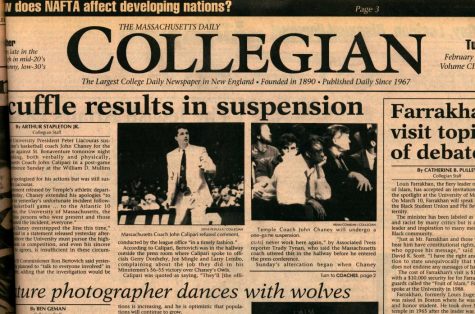
The Rematch
“The City of Brotherly Love?
Huh?
That phrase certainly does not fit tonight’s scenario in Philadelphia when the No. 11 Massachusetts Minutemen (22-5, 12-1 Atlantic 10) take on the No. 8 Temple Owls (20-4, 12-3 A-10) in a rematch of a thrilling 56-55 UMass victory at the William D. Mullins Center on February 13.”
–Jeff Crofts, Massachusetts Daily Collegian, Feb. 24, 1994
Vautour: I just remember that UMass had been very prominent in college basketball in and around that time, but never was it the middle of the college basketball universe as it was right then and there, and everyone was talking about. Is Chaney going to get suspended, is this going to carry over to the next time they play, what’s going to happen? I think Cal recognized a moment to publicize it and play it up, I remember him saying like, his daughter was asking him like “Daddy, are you going to get hurt if you go to Philadelphia?” and all this. Cal was crazy.
Clark: Then there were all these rumors that UMass wasn’t going to go and play the game at Temple the following week until Chaney came out and apologized, and he actually did eventually come out and apologize, it was pretty tearful. It was still pretty tense when we went to Temple a week later. Media like you would not believe coming out of the woodwork for that game, and everyone’s wondering what was going to happen, was there going to be a handshake or a hug before the game and all that.
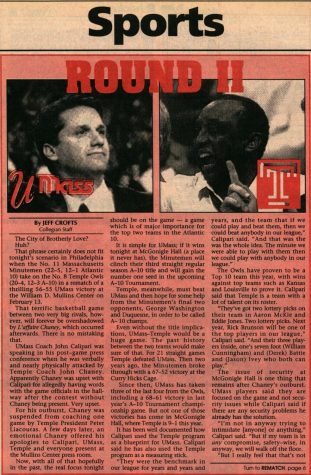
Stapleton: That game down at Philly, you can only imagine the security. It was always tough to go to McGonigle [Hall] anyways. It was right in the heart of Philly, a bit of a rough neighborhood, and now you had UMass coming down after the fight with Chaney — I remember that night being very tense.
Germain: When we went to Temple afterwards, it was nervous. Like, we were really nervous about what was going to happen. We got off the bus at the arena before the game, and we had cops lined up from the door of the bus to the door to the gym, just so nothing would happen. There were no major problems, but there were some fans out there that were kind of harassing us, nothing crazy like throwing things or anything, but it was a little nervous and scary getting off the bus because you didn’t know what was going to happen.
Wetzel: It was so rowdy. McGonigle Hall was even smaller than the Cage, but it was an awesome place for a game. And I remember it being so loud, they had all these security guards around Calipari. It was ridiculous, like someone was going to come out of the stands and stab Calipari — like, it’s a college basketball game. It got so dramatic, I remember being like, give me a break. They’re just college basketball fans, they’re Temple students.
I remember someone was selling this t-shirt outside, they had like the tale of the tape, and they had the two coaches — Chaney was listed at like 6-foot-4, 230 pounds, and Cal was like 5-foot-9, 140 pounds, it was hilarious.
Clark: [Calipari and Chaney] were pretty civil, they hugged before the game, and whether they were playing it up for the cameras or whatever, who knows, but they were civil, and lo and behold, another typical UMass-Temple game, right down to the wire.
At McGonigle Hall you kind of walk in off the street level, and there’s a walkway way up behind one of the baskets, and then there’s bleachers on both sides that come down to where the floor was. But there was so much media that they had a whole press row of seats on this walkway, up top, and I was sitting up there almost like eye-level with the backboard. So Mike Williams lets fly this shot, and I could’ve sworn the thing was coming right into my lap, I mean it was so off-line.
Germain: That was insane because that play was designed for Lou [Roe], and we were only down two. And then Mike comes down and takes like a heave and banks it off the glass. And we’re just like “what is he doing?” And then it goes in and we’re like “you’ve got to be kidding me.”
Wetzel: Mike Williams banked in a shot, and it was classic Mike Williams, it was all he did. He would just hit these crazy shots to win games. Mike Williams never cared about all that stuff — he was so clutch, man, and that was a big shot for those players that wanted to defend their coach.
Clark: It was a desperation shot, maybe a couple strides in from half-court. Wouldn’t you know, the thing banks off the glass and goes in. I mean, that was Mike Williams in a nutshell back then, he just had a knack for the improbable. UMass escapes, wins that game, and had to play Temple again in the A-10s.
“The Temple-Massachusetts rematch that’s had folks hyperventilating for two weeks took place last night at McGonigle Hall. Answer to the first question: No. No one got hurt. Answer to the second question: The Owls lost to the Minutemen. Again. By one point, 51-50. Again. On a desperation shot by Mike Williams, the master of buzzer-beaters. Again.”
– Ray Parrillo, Philadelphia Inquirer, Feb. 25, 1994
UMass beat Temple again in March to win their second of five consecutive A-10 tournament titles — the last four of which each came at home against Chaney’s Temple — but fell in the second round of the NCAA Tournament.
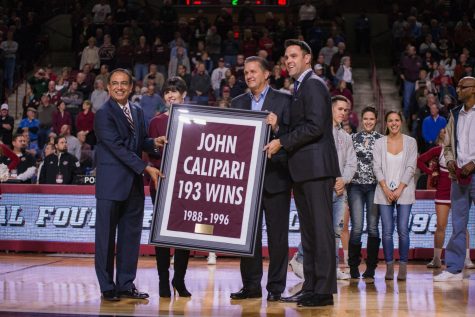
Wetzel: That thing really launched [Calipari], that was a big one for him too. They had made a Sweet Sixteen, but he became way more famous after that, and I think it helped him in the long run. It was just this crazy thing, and all of a sudden everybody knew who he was, even beyond just people who followed college basketball.
Vautour: At first [Calipari] had stopped the press conference because he didn’t want to say something dumb. At first he tried to downplay it a little bit, but then he recognized that this was a moment for his program, in a weird sort of way, and he always recognized marketing opportunities — I think he looked at it after the fact and said well, this makes the UMass-Temple rivalry better which is good for TV and exposure and that kind of thing, and there’ll be more attention on UMass after that and on him after that. I don’t think he’s disappointed it happened, and I think if you asked him if he could go back and erase it from history, I think he wouldn’t.
Stapleton: Calipari was kind of Pitino-lite at the time, and people loved Pitino, so they loved Calipari too. They were this young, fun story, and they weren’t really doing it with a lot of blue-chip prospects, they were doing it with sort of lunch-pail kind of guys. I mean, Derek Kellogg was the starting point guard, even going into that season nobody expected Kellogg to be anything and I think he turned into an all-league player, so that would kind of be my take on the whole thing. I think the creation of what Calipari became, it’s hard to imagine what he was that year.
That year, Chaney made him sympathetic in a way, and it’s hard to go back to that point, but he really was. Calipari built a kingdom on campus, and everybody revered him and what he did.
Clark: Obviously you refresh your memory over the years, you keep seeing the clip come up all the time, and there are just things you do in your career that will never leave you, and I’ve been doing this 30 years total, going back to when I was at the Collegian, and I can’t thing of something that even comes close to that, as far as the craziest thing I’ve ever covered. That was something else.
I really can’t believe it was 25 years ago, I really can’t believe it. I can’t believe that whole era was that long ago. It was amazing, it really was.
Stapleton: It was a crazy time to be around the program. Calipari set out to do something, and he did something that will likely never be duplicated again. When I went to UMass and I got accepted, they were a lacrosse school. It was all about the lacrosse team, football was in the Yankee Conference. That’s where UMass was, it was girls soccer and men’s lacrosse, and Calipari turned it into a basketball school, and by the time I left, that’s all UMass was known for.
It was an amazing run, I mean, UMass won the A-10 four years in a row that I was there. I couldn’t have asked for anything better.
Vautour: It’s funny because UMass was ranked for at least part of each of the seasons that I was a student, and so they were an NCAA Tournament team all four years, A-10 champions all four years.
I don’t think we knew that it wasn’t supposed to be be like that. I don’t think the students had a real appreciation for how amazing those moments were. I do now, having seen UMass for 20 years I have a much wider angle on my lens, but at the time…
I don’t even know if we realized just how crazy it was.
Amin Touri can be reached at [email protected], and followed on Twitter @Amin_Touri.
Editor’s Note: John Calipari declined to be interviewed for this story.
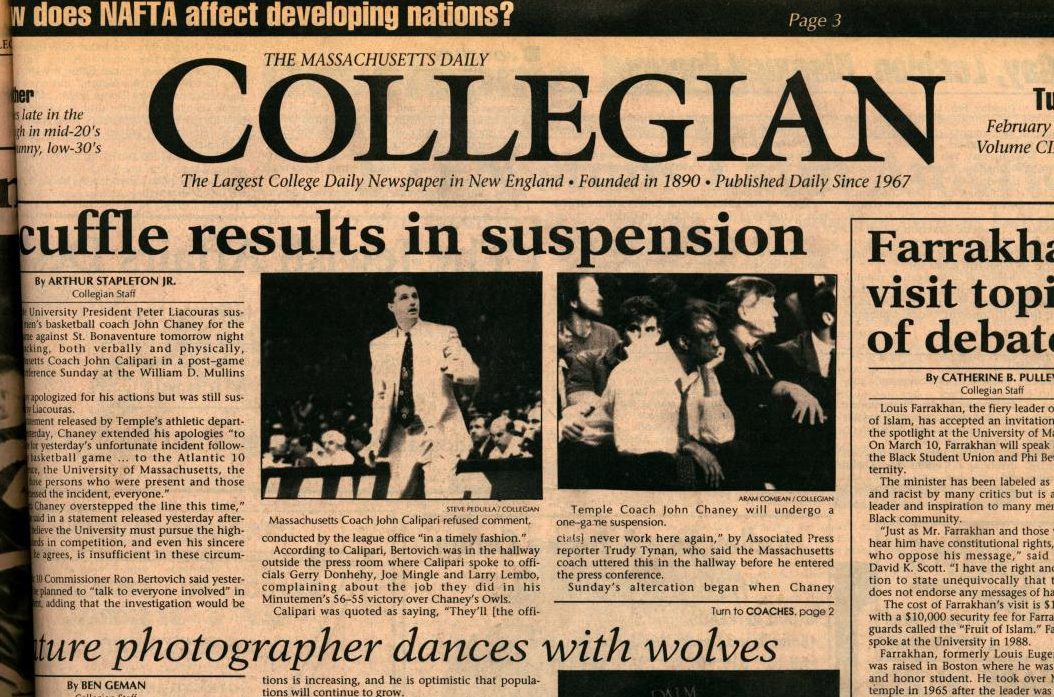
Fred Benson • Sep 12, 2021 at 11:28 am
Calipari’s from Pittsburgh, Chaney’s from Philly. It was really a black eye for Pennsylvania. When Flyers & Penguins fans mouth off, it reminds me of Calipari and Chaney. So, when you see a fan fight between Philly and Pittsburgh, or the Red Sox & Yanks, think of Cal and Chaney. Anheuser-Busch was right. Know when to say when.
Sean • Feb 14, 2019 at 12:38 pm
I remember trying to figure out if we could sell the audio to ESPN for beer & pizza money.
Jerry • Feb 14, 2019 at 11:38 am
Great read. I, too, was there. At the scorers table as Temple’s SID. In the locker room right after the game. In the corridor after coach Chaney’s press conference when he was just hanging out with family. Back in Temple’s locker room – we had an open locker policy for media – when some startled someone burst in saying nothing more than “COACH!” Running back down the corridor. And finally back into the press conference area when the discussion was taking place. I think there was only one TV camera left in the room at the time, and that’s why we only see one video version of the incident. Temple/UMass in the early ’90s was the intense of a rivalry of the day. My goodness! Temple had won the first 21 games in the series, but UMass had won three of the prior four games – and would win 12 of 13 at one point – and was loaded with talent. Temple, with Eddie and Aaron and Brunson, was, too; it won at No. 3 Kansas earlier that year. It frustrated and smothered No. 5 Louisville. Beat Villanova. We arrived back in snowy and slushy Philadelphia the next Monday morning and I walked around downtown and through the Italian Market (looking for broccoli rabe) with Coach and a Sports Illustrated photographer. This is around the time Gary Smith did his wonderful story on Coach Chaney. When I finally got to my office in McGonigle Hall, the great Al Shrier was speechless. And I had a pile of phone messages left on my desk. I do believe Coach Chaney attended and spoke at a “roast” for Coach Calipari later that year … in July or August at, I think, the Meadowlands.
A Kentucky Wildcat • Feb 13, 2019 at 11:26 pm
I came over to this article from a link at Kentucky Sports Radio blog.
http://kentuckysportsradio.com/basketball-2/its-the-25th-anniversary-of-john-calipari-and-john-chaneys-fight/
I enjoyed the detailed memories of all contributors and the editor who put it all together. What a wonderful time to be a student at UMass. It was like being a part of the event hearing so many sides of it. Thank you for posting. Go Minutemen!
Jon Hite • Feb 13, 2019 at 10:23 pm
Amin- I agree wholeheartedly with Buck–this is a great piece. Great story idea and research. I was at the game that day; and you’re telling of the rivalry is spot on. And how the heck did you track down Larry Lembo? Congratulations -Jon Hite ’78
Amin Touri • Feb 14, 2019 at 11:33 pm
Thanks Jon! Finding Larry is a long story, but the short version is two hours of internet searching narrowed it down to two Larry Lembos, a father and son, and his son is a chiropractor on Long Island so I called his office, the secretary took the message for Dr. Lembo, who had his father call me later that night. I couldn’t believe he actually called me, but it’s my favorite part of the story. Thanks for reading!
Mike • Feb 13, 2019 at 9:47 pm
Remember it like it was yesterday. I haven’t watched the video in years and I was in tears laughing so hard. Love coach Chaney
TJ McEvoy • Feb 13, 2019 at 7:59 pm
This is great. Thank you so much for the work putting it together. What a time to be a Umass (or “Mass”) fan. Thank you.
Steve Buckley • Feb 13, 2019 at 2:11 pm
My tweet @BuckinBoston: I was about one-third through this article when I stopped and thought to myself: This is one of the best pieces of writing in the history of the UMass Daily Collegian. As a former Collegian staffer, I’m damned proud. Congrats, Amin. Best, Steve Buckley ’78
boris • Feb 13, 2019 at 9:45 am
incredible story…incredible writing detail….incredible coach- the best….best collegian story ever….
Jeff Crofts • Feb 13, 2019 at 9:40 am
That’s a helluva lede for the rematch at Temple.
Those were interesting times.